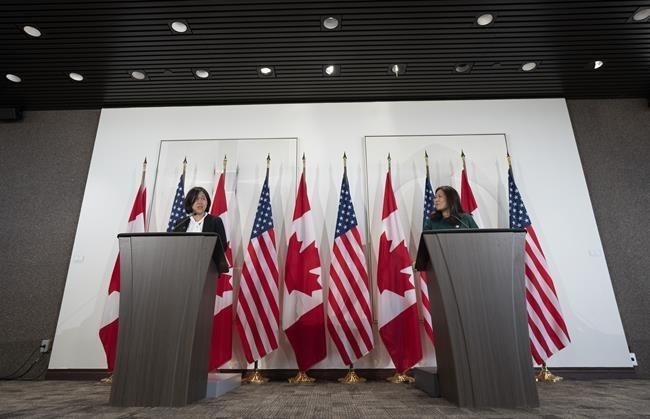
International Trade Minister Mary Ng, right, and U.S. Trade Representative Katherine Tai speak during a joint news conference in Ottawa, Thursday, May 5, 2022. Tai is urging her Canadian counterpart to abandon plans for a digital services tax and to allow U.S. home shopping programming to operate north of the border.THE CANADIAN PRESS/Adrian Wyld
Republished July 07, 2023 - 3:39 PM
Original Publication Date July 07, 2023 - 8:16 AM
WASHINGTON - Canada, the United States and Mexico wrapped up a two-day status report on their shared continental trade agreement Friday as the deal that replaced NAFTA passed its three-year anniversary.
There are three more years to go before a required review in 2026 that has the potential to scuttle the U.S.-Mexico-Canada Agreement, but International Trade Minister Mary Ng doesn't sound worried.
The Free Trade Commission meetings, this year hosted by Mexico, are an annual exercise to ensure the deal is being implemented as designed — and to hear Ng tell it, each year offers more proof that the USMCA is worth saving.
"This is the largest trading relationship in the world, and we are working together to be more competitive," Ng said in an interview after the meetings wrapped up.
Ensuring the three countries can get past the 2026 review for USMCA, known in Canada as CUSMA, will guarantee a full 16 years of prosperity until the current terms of the agreement expire in 2036, she said.
"We all recognize there's a date in 2026, but 16 years, 2036 — that's the goal."
Much of the discussion focused on "under-the-hood stuff," she said, including efforts to ensure small and medium-sized businesses are better integrated into the value chains the agreement is meant to foster.
It also focused on assessing efforts to introduce labour reforms in Mexico, where Ng said Canada's labour unions have been integral in helping to ensure more workplaces are meeting the standards set out in the deal.
The union certification process, once a six-year ordeal, now takes only six months, she said, with some 10,000 new collective agreements in place to benefit an estimated 500,000 newly unionized workers.
During bilateral discussions Thursday, Ng and U.S. Trade Representative Katherine Tai exchanged long-entrenched positions on the usual array of irritants, including Canada's plan to implement a digital services tax next January.
The measure is aimed squarely at digital enterprises that are based outside Canada — many of them headquartered in the U.S. — that generate revenues from the engagement, content and data of their Canadian users.
Canada has delayed implementing the three per cent levy until 2024 in hopes of waiting out a separate but similar international digital tax regime, spearheaded by the Organization for Economic Co-operation and Development.
Separate U.S. and Canadian summaries of the bilateral meeting featured Tai urging Ng to abandon the tax plan, and Ng urging Tai to sign on to the OECD measure, which it has yet to do.
"Canada was very much a part of that" OECD effort, as was the U.S., Ng noted. "We all negotiated this, so let's work as hard as we can to get this implemented."
Tai also called on Ng to make good on a USMCA commitment to allow home-shopping channels like QVC to operate in Canada — an effort the minister said is well underway and close to fruition.
"We've made good progress — this is one of those files that I would classify as 'well advanced,'" she said.
"We are working to implement that part of the agreement ... and that work continues."
Ng said she also pressed Tai on two other outstanding issues: duties on Canadian exports of softwood lumber, and the question of whether the U.S. will abide by a tribunal ruling on automotive parts.
A dispute panel ruled late last year that the U.S. interpretation of foreign content rules for autos was "inconsistent" with the terms of the deal.
The USMCA increased the allowed "regional value content" for automotive parts to 75 per cent, up from 62 per cent, as part of an effort to give all three countries a bigger piece of each other's auto manufacturing sector.
In a core component such as an engine, the long-standing concept of "roll-up" allows such a part to be considered as having 100 per cent North American origins once the regional threshold of its various elements is met.
It's an essential step to determine which vehicles are deemed duty-free. The U.S. had tried to argue for a more rigid interpretation of the agreement's language, but the panel rejected that argument outright.
Since then, the U.S. has been largely silent on how it intends to respond, and officials in Tai's office offered no clues during a telephone briefing Wednesday about whether the meetings would produce any clarity.
This report by The Canadian Press was first published July 7, 2023.
News from © The Canadian Press, 2023